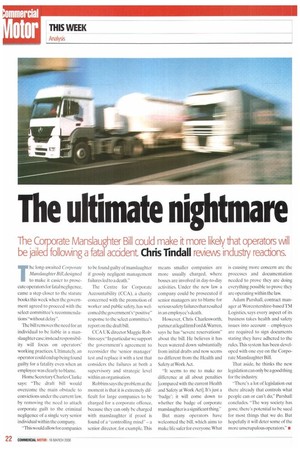The ultimate nightmare
Page 22

If you've noticed an error in this article please click here to report it so we can fix it.
The Corporate Manslaughter Bill could make it more likely that operators will
be jailed following a fatalaccident Chris Tindall reviews industry reactions.
The long-awaited Corporate Manslaughter Bill, designed to make it easier to prosecute operators for fatal negligence, came a step closer to the statute books this week when the government agreed to proceed with the select committee's recommendations "without delay".
The bill removes the need for an individual to be liable in a manslaughter case; instead responsibility will focus on operators' working practices. Ultimately, an operator could end up being found guilty for a fatality even when an employee was clearly to blame.
Home Secretary Charles Clarke says: -The draft bill would overcome the main obstacle to convictions under the current law, by removing the need to attach corporate guilt to the criminal negligence of a single very senior individual within the company.
"This would allow for companies to be found guilty of manslaughter if grossly negligent management failures led to a death."
The Centre for Corporate Accountability (CCA), a charity concerned with the promotion of worker and public safety, has welcomed the government's" positive" response to the select committee's report on the draft bill.
CCA UK director Maggie Robbins says:"ln particular we support the government's agreement to reconsider the 'senior manager' test and replace it with a test that considers the failures at both a supervisory and strategic level within an organisation.
Robbins says the problem at the moment is that it is extremely difficult for large companies to be charged for a corporate offence, because they can only be charged with manslaughter if proof is found of a "controlling mind' a senior director, for example. This means smaller companies are more usually charged, where bosses are involved in day-to-day activities. Under the new law a company could be prosecuted if senior managers are to blame for serious safety failures that resulted in an employee's death.
However, Chris Charlesworth, partner at legal firm Ford &Warren, says he has "severe reservations" about the bill. He believes it has been watered down substantially from initial drafts and now seems no different from the Health and Safety at Work Act.
"It seems to me to make no difference at all about penalties [compared with the current Health and Safety at Work Act]. it's just a 'badge': it will come down to whether the badge of corporate manslaughter is a significant thing."
But many operators have welcomed the bill, which aims to make life safer for everyorte.Wbat is causing more concern are the processes and documentation needed to prove they are doing everything possible to prove they are operating within the law.
Adam Purshall, contract manager at Worcestershire-based TM Logistics, says every aspect of its business takes health and safety issues into account employees are required to sign documents stating they have adhered to the rules. This system has been developed with one eye on the Corporate Manslaughter Bill.
That aside, he thinks the new legislation can only be a good thing for the industry.
"There's a lot of legislation out there already that controls what people can or can't do," Purshall concludes, "The way society has gone, there's potential to be sued for most things that we do. But hopefully it will deter some of the more unscrupulous operators."•
































































































































































































